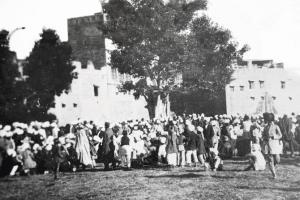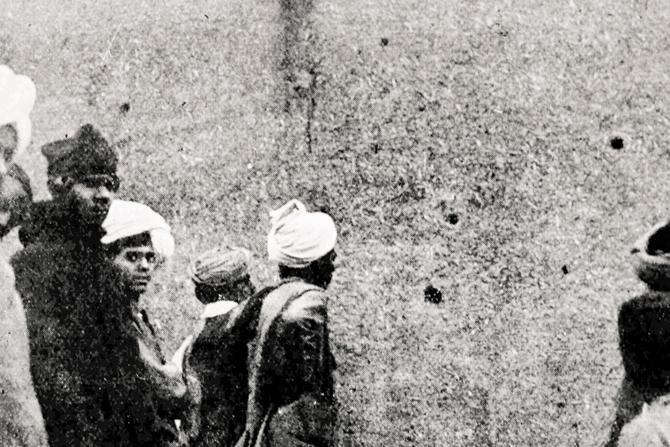While a sorry from the UK government still eluded India on the 100th anniversary of the Jallianwala Bagh massacre, historians and politicians feel the debate should not end with a symbolic gesture

A crowd at Jallianwala Bagh, late summer 1919. PIC Courtesy/The Nehru Memorial Museum and Library for Jallianwala Bagh: An Empire of Fear and The Making of The Amritsar Massacre (Penguin Random House)
Too many historical and literary texts have re-imagined and revisited the horrors of Jallianwala Bagh in Amritsar. But 100 years on, except for a neglected memorial and bullet holes pockmarking the ageing brick walls of the desolate landscape, spread across 6.5 acres, there is nothing to tell you that this continues to be the archetype of the British Empire's ruthless colonial past. The only semblance of the gore, if any, is of the "flowers [growing here] nurtured with blood" as Punjabi poet Sohan Singh Misha wrote in his 1964 poem. "It's the first act of colonial violence that shocked the British public. There were previous incidents, but they didn't give rise to the soul-searching like the incident at Amritsar did. It is difficult to not perceive this as monstrosity. Because, you had 20,000 unarmed civilians on one hand, and British-Indian soldiers mowing them down on the other. As an event itself, it was very stark," says Kim A Wagner, who recently authored Jallianwala Bagh: An Empire of Fear and The Making of The Amritsar Massacre (Penguin Random House).

Locals inspecting bullet-holes at Jallianwala Bagh in late 1919. Pic Courtesy/L'Illustration, 20–27 March 1920
ADVERTISEMENT
On Saturday, April 13, when India marked the centenary year of that brutal bloodbath - the Partition Museum in Amritsar has identified 502 who had died, with plausibly a similar number of unaccounted deaths - the disappointment was visible, as repeated calls for a formal apology from the UK government, came to naught. Where MP Shashi Tharoor had hoped that a member of the Royal family would visit Jallianwala Bagh to show "remorse and contrition for the horror," we had to settle for PM Theresa May expressing "deep regret" for the incident in the British Parliament. But in this clamour for a "sorry" - one that is being construed as the final act of atonement - what is being overlooked, say historians, is the need for this calamitous event to be retold and differently, so that its heinousness is not lost on us.

Kim A Wagner, Kishwar Desai and Lord Meghnad Desai
Bloodied history
Kishwar Desai who chairs the Arts And Cultural Heritage Trust (TAACHT), which set up the world's first Partition Museum at Town Hall in Amritsar, wrote Jallianwala Bagh, 1919: The Real Story (Context, Westland), because she felt that there was a need to "reclaim the Indian narrative". "The oppression and repression of Punjab had been on for many years, and Jallianwala Bagh was a slow build up to the restlessness among citizens. I felt I had to write a book from the Indian perspective because most of the literature coming out [on the incident], was from the European point of view, which often gave a valid reason for what happened. We needed to take charge of our own narrative and tell our own story," she says.
Wagner, who teaches global and British imperial history at Queen Mary University of London, says that "he was very conscious" about this charge, when weaving his account on the incident. "I refuse to accept that there is a British version and an Indian version. You have to show a balance, but it is difficult, because since it is colonial history the evidence is also that the balance is always tilted in favour of the British voices."
Both Kishwar and Wagner dug deep into file records and stories of the events pieced together from locals, while also sifting through material in the otherwise, "inadequate" official reports. In Kishwar's narrative, there is the heart-rending story of Ratan Devi, who found the corpse of her husband, among heaps of dead bodies, and sat beside it all night. Wagner, in his book, made the city of Amritsar the main protagonist. "Whatever happened, was about space: the division between the old Indian city and the European way of life. The massacre is just one part of a series of events, in the week both before and after, and they really are the key to understand what happened on that day. I don't think adequate attention was given to the small individual experiences along the way. This was the climax. There were ordinary people in the middle of it, and nobody knew that it was a watershed moment."
In her reading, Kishwar says that it was clear that Jallianwala Bagh was a conspiracy. "The incident would have not been possible if the entire administration had not been complicit. This was what the British were trying to cover up. They made it about one man, General Reginald Dyer, and claimed that this was not the British way of doing things."
Will apology bring closure?
British economist and Labour politician Lord Meghnad Desai, who was among the leaders who had initiated a debate on the incident in the House of Lords this February and also sought for a formal apology, says that "the UK government admits that this was a serious event". "The Queen expressed sorrow when she visited Amritsar in 1998 and so did [former British PM David] Cameron. Now, the Government is saying that the Foreign and Commonwealth Secretary is considering the issue and may issue an apology as and when he visits India. At present the Brexit debate has so taken over all business that it is unlikely an apology will be issued," says Lord Meghnad.
Kishwar, however, doubts that an apology is ever coming our way. "I think it's very shabby on their part. It shows that they still do not consider our demands to be of a nature to be taken seriously. Their argument is that a formal apology will have financial implications, because they will then be liable to make payments to the victims. But, that's not what the victims' families are demanding. We have our own government to take care of this," she says. Wagner feels that "too much emphasis is being placed upon the ritual of an apology". "There was a debate at Westminster Hall this week, where a number of British politicians asked for an apology, but almost all of them said that the apology is not in itself enough."
Lord Meghand says, "The real gesture would be to help the people from the subcontinent currently living in the UK or be more generous in helping Indians who wish to come to study or work here." Wagner adds, "What is required that we in Britain, need to think about the empire differently, and that an event like the massacre, is taught properly in school. I see a lot of value in that, and so, in that sense, if the apology is a beginning of a debate and sentimental reckoning of the past, it has some value."
Catch up on all the latest Mumbai news, crime news, current affairs, and also a complete guide on Mumbai from food to things to do and events across the city here. Also download the new mid-day Android and iOS apps to get latest updates
 Subscribe today by clicking the link and stay updated with the latest news!" Click here!
Subscribe today by clicking the link and stay updated with the latest news!" Click here!







